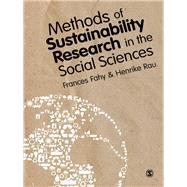- ISBN: 9780857025227 | 0857025228
- Cover: Paperback
- Copyright: 2/28/2013
Sustainability is a key concept used by social scientists interested in interactions between human society and the environment. Although hotly contested and subject to intense debate, it offers an important starting point from which to explore the connections and exchanges between people and the biophysical world they inhabit. In addition, sustainability has the potential to provide a shared conceptual space for inter- and transdisciplinary research on social-ecological issues that brings together people with diverse disciplinary backgrounds and diverging worldviews. This book offers a systematic and critical review of established and emerging methodological approaches and tools for the integrated investigation of sustainability questions. Recognising the significance of scale for sustainability efforts and measurement, its scope ranges from the local to the global. This emphasis of socio-spatial scales is complemented with systematic reflections on the centrality of time in sustainability thinking and practice and its implications for research. The book is divided into four areas: Part I: examines the key challenges inherent to social scientific sustainability research, focusing in particular on epistemological and methodological questions that arise from recent efforts towards greater disciplinary integration. Part II: discusses methodologies aimed at the investigation of attitudes and behaviour observable at the local level - from families and households to individual organisations within communities Part III: focuses on comparative sustainability research across different levels of socio-political organisation - from cities and regions to nation-states. Part IV: covers recent developments which recognise the significance of time for sustainability research and which offer innovative methodological approaches that focus on life events and long-term outcomes. It also offers a critical assessment of current and future trends in social-scientific sustainability research and reflects on both chances and challenges of doing research that aims to be relevant to diverse audiences, including academics, policy makers, sustainability advocates and practitioners. Bringing together contributions from international social scientists, the book will be suitable for academic and non-academic audiences interested in sustainability research and will be a core teaching text for undergraduate and postgraduate courses in sustainability and sustainable development, geography, environmental sociology and the environmental sciences.






